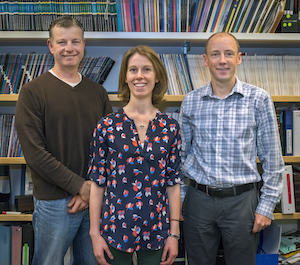Researchers have shown that when parts of a genome known as enhancers are missing, the heart works abnormally, a finding that bolsters the importance of DNA segments once considered “junk” because they do not code for specific proteins. The study, led by Environmental Genomics & Systems Biology (EGSB) Division scientists Diane Dickel (middle), Axel Visel (right), and Len Pennacchio (left),  appears in the journal Nature Communications. The team included other members of EGSB’s Mammalian Functional Genomics Laboratory and collaborators from the Ludwig Institute for Cancer Research and UC San Diego.
appears in the journal Nature Communications. The team included other members of EGSB’s Mammalian Functional Genomics Laboratory and collaborators from the Ludwig Institute for Cancer Research and UC San Diego.
Scientists examined the role of two heart enhancers in the mouse genome, showing that the loss of either one resulted in symptoms that resemble human cardiomyopathy, an often fatal disease in which the heart muscle often becomes enlarged or rigid. In addition, the researchers provided a comprehensive genome-wide map of more than 80,000 enhancers considered relevant to human heart development and function. These enhancers are involved in regulating gene expression, even though they do not encode for proteins directly, and will become more important as personalized medicine becomes more prevalent. Read the news release by Sarah Yang at Berkeley Lab News Center.



